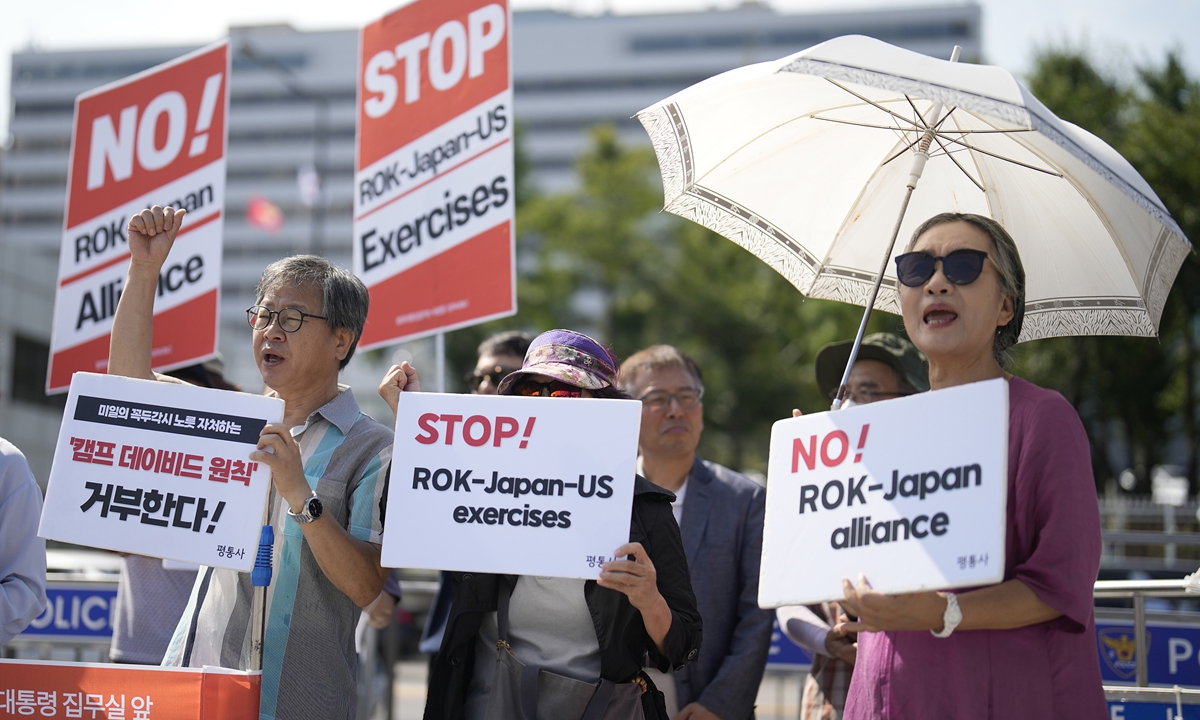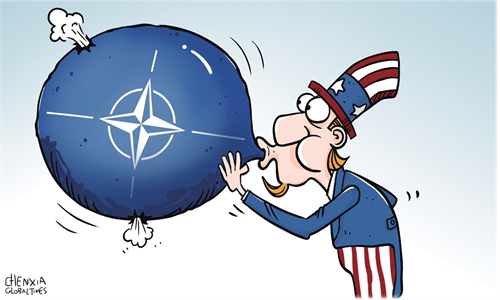
Photo: Visual News
On Friday US time, US President Joe Biden hosted Japanese Prime Minister Fumio Kishida and South Korean President Yoon Suk-yeol for a trilateral leaders' summit at Camp David. Some observers from Japan and South Korea are excited, using wordings likes "historic" and "breakthrough" to describe the event. However, for Northeast Asia and even the broader Asia-Pacific region, such cooperation could mark a regression into history, potentially pulling the region back into the fragmented and confrontational era of the Cold War.
The three-country summit will not only help address "the continued threat posed by North Korea" but also "strengthen ties with ASEAN and the Pacific Islands" and address matters related to "economic security," observers said. Furthermore, the parties plan to hold regular summits in the future, establish a hotline between their leaders and solidify the mechanism for US-Japan-South Korea trilateral cooperation. This has also led to speculation: Could the US, Japan and South Korea establish a formal trilateral alliance?
For each of the three countries, enhancing trilateral cooperation serves a distinct purpose. The strategic intentions of the US are evident. For Japan, strengthening cooperation with the US and South Korea provides an avenue to further break away from the constraints of its post-war pacifist Constitution and accelerate its pace toward becoming a major military power. And it wishes to take advantage of US and South Korea's influence to seize the dominant position in the Indo-Pacific region, becoming a political powerhouse. For South Korea, the frequent missile tests by North Korea have raised security concerns. South Korea aims to effectively cope with the "threat" from North Korea while boost its influence in the Indo-Pacific region through cooperation with the US and Japan.
While US-Japan-South Korea trilateral cooperation has a long history, it has been hampered by conflicts between Japan and South Korea as well as differences in their respective interests. The triangular relationship has consistently shown an imbalance. Despite recent improvements in Japan-South Korea relations, the fundamental constraints have not been eradicated. Thus, establishing a treaty-based trilateral alliance among the three parties in the short term is not realistic. Instead, trilateral cooperation is expected to expand broader, significantly bolstering coordination in military security, supply chains, technology and regional hot topics. However, this cooperation is still driven by the Cold War mentality of camp confrontation and zero-sum games. It's not difficult to foresee that the expansion of US-Japan-South Korea cooperation could bring about multiple risks and challenges to the region.
Firstly, it could disrupt regional strategic stability. The trilateral military cooperation between the US, Japan and the Republic of Korea, in the name of dealing with "threat" in the region, is expanding gradually from conventional joint military exercises to anti-missile drills and anti-submarine drills. It is also anticipated that they would establish intelligence sharing system, and strengthen deterrence provided by the US, including the nuclear umbrella. This will inevitably stimulate an escalation of tensions on the Korean Peninsula, an arms race in the region and the risk of nuclear proliferation.
Secondly, it could exacerbate regional camp confrontations. Guided by US' strategy of great power competition, the expansion of US-Japan-South Korea cooperation from Northeast Asia to the Indo-Pacific realm could emphasize exclusivity, competition and camp confrontation. This could further cement the characteristics of a mini-NATO in East Asia and intensify the pressure on smaller and middle-sized countries in the region to pick sides.
Thirdly, it could impact regional integration efforts. In the fields of economy, trade and technology, the US, Japan and South Korea might focus on safeguarding their monopoly advantages in high-end industry chains and high-tech sectors. This could lead to intensified exclusive cooperation in areas such as semiconductors, digital economy, network security and space, with an aim to seize dominance in cutting-edge technological standards and economic and trade regulations, thereby upholding technological hegemony. Especially pronounced is the "de-Sinicization" aspect of competition against China, which could undermine existing multilateral cooperation mechanisms and supply chain collaborations in the Asia-Pacific region.
It must be pointed out that the US is evidently attempting to enlist Japan and South Korea to collectively confront China. Domestic analyses in South Korea suggest that the country's foremost direction should be the peaceful reunification of the Korean Peninsula. And it necessitates cooperation and support from China. Economically, South Korea's reliance on China is greater than that on the US and Japan. If South Korea blindly aligns itself with the US and Japan, it could worsen the situation on the Korean Peninsula, constrain its strategic maneuverability and ultimately harm the nation's long-term interests. Particularly for South Korea, it is crucial to maintain strategic clarity and promptly apply the brakes to the dangerous progression of US-Japan-South Korea cooperation.
The author is a research fellow at the China Institute of International Studies. opinion@globaltimes.com.cn

